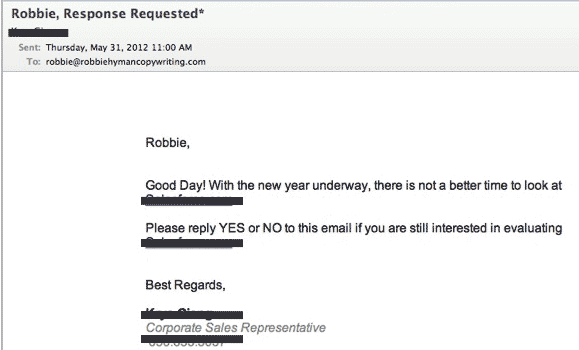Want to ruin your email reputation? Here are a few shortcuts.

Above is a screenshot of a sales email I received recently.
Wow.
The sender packs quite a few violations of logic, fact and etiquette into just three sentences.
Let’s start with the subject line: “Robbie, Response Requested.”
Huh? I don’t know this person, didn’t ask for this email and have no idea what’s in it. But the sender has used her subject line to call me out by name and obligate me to complete a task for her.
Already I’m annoyed. But I’m also curious. I certainly don’t want to ignore a legitimate request. So I open it. In other words, the sender has exploited the goodwill of her recipient to get her email read.
First line: “Good day! With the new year underway…”
Stop.
The new year? Check the date on the message. Sent May 31st.
That’s a pretty loose definition of “new year.” I tend to define the period as lasting only until I’ve broken my final New Year’s Resolution – usually January 2.
But even if we were still in the “new year,” why would that logically compel me to try this service?
The sender doesn’t even bother trying to make the case that connects the new year to what she’s selling. She simply uses it as filler to leap illogically to a request she hasn’t earned: getting her recipient to try her service.
And let’s not forget: it’s actually May 31st!
Also, she’s trying to sell me something without devoting one word to explaining what value it will have for me. If she’s going to ask me to try her service, shouldn’t she give me at least one reason I would want to?
Next comes this: “Please reply YES or NO to this email if you are still interested…”
Stop.
Now she’s telling me what to do. Please make my job easier by telling me if you’re not interested.
Yes, I could give a few more seconds and a little more energy to this email and make this sender go away. But should I have to?
If she wanted to show respect for her recipient’s time (a key element in any good email), the sender could have written something like: “If you’d like to evaluate [my service], please let me know. If not, thank you for your time and best wishes.”
She’s already used up her (unearned) favor by getting me to read her request. That completes my responsibility to this email. Asking for more is just selfish.
Okay, rant complete. Now for the lessons:
1) Make your subject line about your readers, not about you.
Your subject line is your first and most important opportunity to tell your readers why your message will matter to them. Don’t squander this opportunity – or worse, annoy your readers – by focusing on what you want or what they can do for you.
2) Show respect for your readers’ intelligence.
Don’t try to confuse your readers or manipulate them. We’ve all read zillions of email messages and can spot those attempts right away. Aside from being unethical, it simply doesn’t work.
3) Show respect for your readers’ time.
When they open and read your email, your recipients are doing you a favor – giving you some of their time, attention and energy (which they can’t get back). So do everything you can to minimize the effort on their part. They’ll recognize it and appreciate you for it.
4) May 31st is in the Spring.


